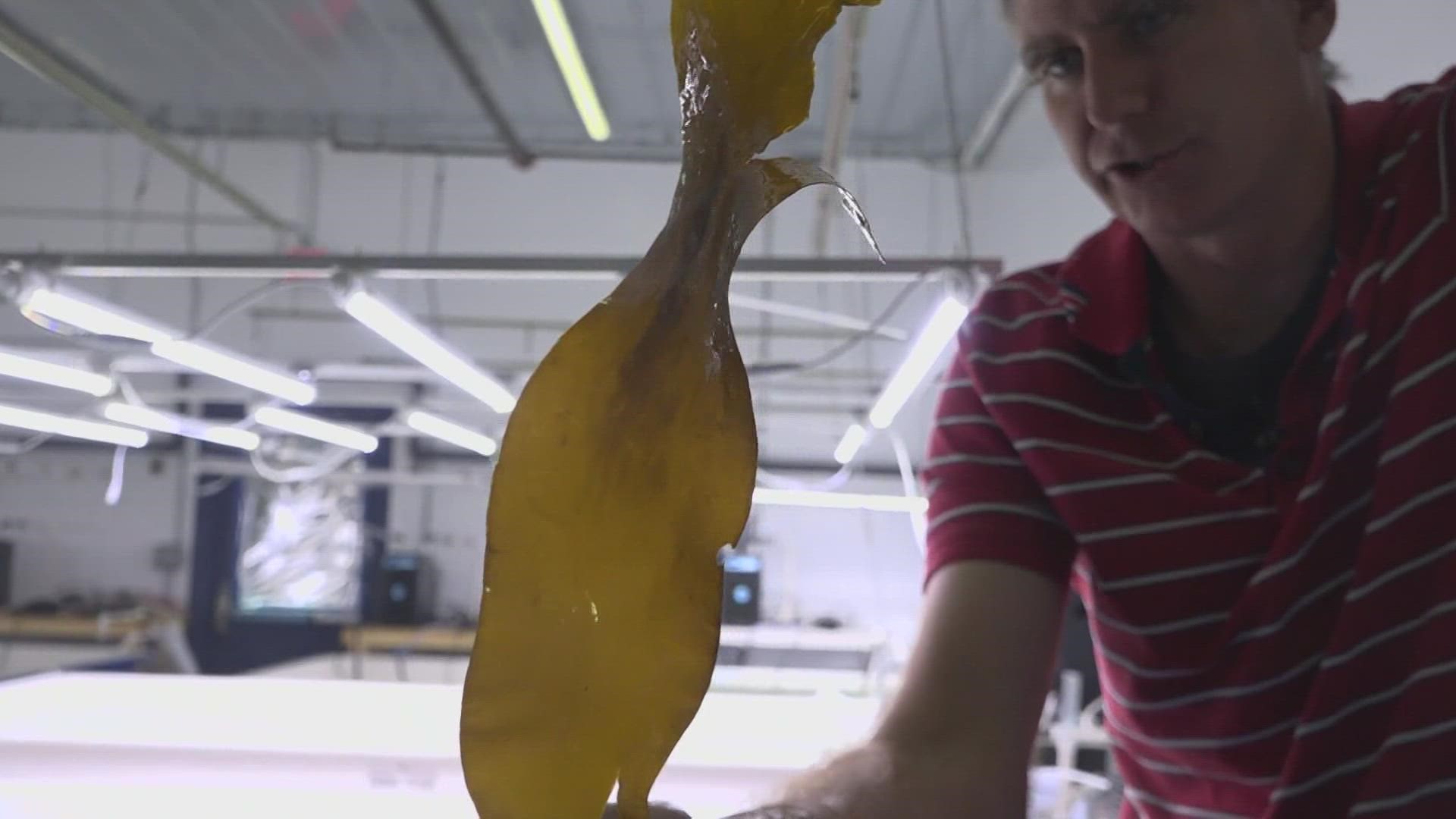BIDDEFORD, Maine — At Atlantic Sea Farms in Biddeford, Thew Suskiewicz works with a team of workers in the early stages of kelp cultivation.
In a room of around a dozen tubs, house another dozen or so spools of twine. Each string is home to thousands of microscopic juvenile kelp.
Suskiewicz is the cultivation manager and said the room of tubs and spools will end up producing more than 1 million pounds of kelp come April.
Dubbed "Dr. Kelp" by his colleagues, Suskiewicz details the ins and outs of the process. Once the kelp reaches a suitable size on the spools, it will be delivered to farmers. Most farmers are fishermen and raise kelp during the winter months to harvest in springtime.
Suskiewicz said he's happy kelp farming is rising in popularity around Maine.
"It's nice to see it taking off here in Maine, we have some of the best conditions anywhere in the world," Suskiewicz said. "Our oceans are getting more acidic, and as the kelp is growing, it's creating this halo effect... raising the PH levels."
The kelp growing on the spools is invisible to the human eye for the first few weeks of cultivation. Suskiewicz said the first noticeable difference is a brown coloration to the twine, then little hairs will sprout.
"Kelp can grow extraordinarily fast ... 2 to 3 inches per day. With a normal tree you have roots that have to bring everything up. With kelp you don't have that problem because they're in an environment that's always wet and has nutrients," Suskiewicz said.
Kelp is known to filter water and absorb carbon from the atmosphere, and now there is research being done to find out if it can do more.
At Bigelow Labs in Boothbay Harbor, Dr. Nichole Price has been working on kelp research at the lab for around eight years.
"We're studying how kelp can help absorb carbon as it grows from the microscopic stage. ... The question is, 'What does that mean for the water it's growing in?'" Price said.
Price said research already shows shellfish growing near kelp farms have seen improved health and thicker shells.
But her recent studies are looking into the ways kelp can take carbon out of the atmosphere permanently once the kelp dies. She calls it "carbon sequestration."
The process involves decaying kelp or parts that fall off, sinking to the sea floor. The kelp that gets pushed into the sand brings carbon with it and stays trapped, deep under the sea floor, with a low chance of that carbon being reintroduced into the atmosphere.
"If that process is truly happening, then that carbon is removed and can mitigate climate change issues," Price said. "We're just at the cutting edge to see what kelp can do for our climate issues."
Price said the research is still very new, and it's impossible to say if that process is in fact happening.
"It's easy to measure that carbon sediments. It's hard to attribute that to farmed kelp," Price said.
The study will involve kelp farmers and look at DNA taken from sedimentary levels of sand from the ocean bottom beneath the farms. It's expected to last two years.
But for the dozens of farmers who make money harvesting kelp, the industry has grown in recent years.
"It's an opportunity for them to diversify their income," Nathan Johnson of Long Island said.
Johnson grew up along Maine's working waterfronts and now fishes tuna. He also harvests kelp in the early spring.
"I think one of the initial drivers was the opportunity to make additional income, but when you learn about the environmental benefits and the opportunity to improve water quality, that's quite a benefit," Johnson said.
Kelp farmers in Maine produced around 450,000 pounds of kelp in 2020. This is nearly double the amount they harvested in 2018, according to The Island Institute. It estimates that amount will be closer to 6 million by 2035.
Johnson added he was one of first independent farmers to sell kelp and is glad to see others joining the industry, but wants to see it treated with respect.
"It's grown quite rapidly but it's important to make sure it's done responsibly," Johnson said. "Having that right balance and really continuing to do it responsibly. ... I feel we all have the responsibility to make the world a better place."

